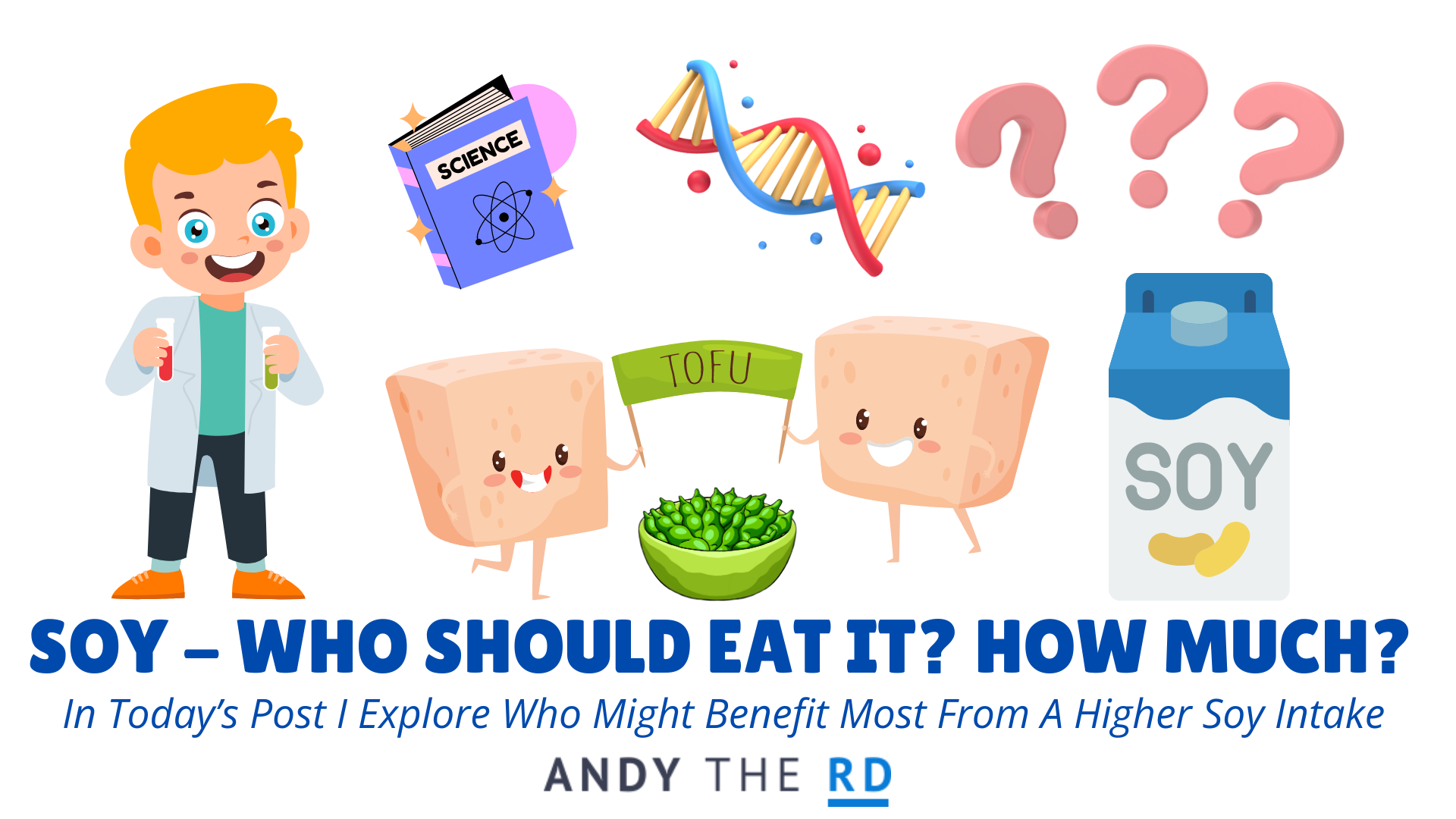In my career I’ve always to devote extra attention to families of foods that are either under consumed or underappreciated relative to their nutritional value.
Soy-based foods like tempeh, tofu, edamame and soy-milk certainly check both boxes.
While I’ll be the first to admit that no one NEEDS to eat soy to live a happy and healthy life, that takes nothing away from the fact that soy foods do offer access to unique compounds like isoflavones and soy protein which are simply found in no other foods.
Keep in mind, no one NEEDS to drink green tea or to consume blueberries either – but to disregard the evidence of their benefit is as unjustified as it is to disregard the evidence supporting the intake of soy foods.
My Bigger Picture Philosophy
Is simply that diversity in one’s protein intake over time is beneficial for health and longevity.
Most people in North America have consumed large amounts of poultry, eggs and red meat in their life and relatively low amounts of soy foods.
My vision is that, perhaps, those foods could play a slightly larger role such that more people can tap into their unique benefits.
So what are those benefits and who is most likely to reap them?
Let’s find out.
Who Would Benefit Most From Soy?
#1 Menopausal Women With Hot Flashes, Inflammation
Soy intake has regularly been associated with improvements in specific menopausal symptoms including both hot flashes and vaginal dryness.
As per a 2021 trial out of the Menopause journal, soy may reduce both the frequent and severity of hot flashes with the amount of daily isoflavones most likely to achieve this benefit being ~50mg.
50mg of isoflavones could be found in:
- 200 grams of tofu (1/2 package)
- 100 grams of tempeh
- 50 grams of soybeans or soy protein isolate or concentrate
We also have meta-analysis data to suggest that soy intake around this level reduces CRP [inflammatory marker] in post-menopausal women.
Those findings are further supported by observational evidence suggesting that soy polyphenols reduce one’s risk of ending up with high inflammatory marker levels.
Given that inflammation significantly increases cardiovascular disease risk, findings like these are important reinforcements of soy’s nutritional value.
#2 People [Especially Men] With High LDL Cholesterol & Triglycerides
High LDL cholesterol is a meaningful risk factor for cardiovascular disease and one of the most common reasons for a pharmaceutical prescription in North America.
I’ve helped many clients tackle this problem, and incorporate soy-based foods into my solution for the simple fact that soy protein has been consistently shown to reduce LDL.
The expected effect is up to a 5% reduction when soy protein intake is around ~25 grams per day – as per meta-analysis data.
25 grams of soy protein could be found in:
- 1 scoop of soy protein powder
- 2/3 package of tofu
- 3x cups soy milk
- 1.5 cups edamame
This same amount of daily soy intake exposure has been demonstrated to lower triglycerides by 7% and increase HDL by 3%.
Keep in mind that high triglycerides and low HDL are BIG risk factors for fatty liver disease – a topic which I discuss at greater length in a recent post.
Why is soy so useful for these concerns?
Scientists believe that soy protein and other soy constituents positively influence fat metabolism on a genetic level by reducing the production of proteins like SREBP-1c and PPARY2 which are otherwise responsible for stimulating synthesis of fatty acids which end up in the blood stream and ultimately inappropriately stored in the liver.
It’s no surprise that observational evidence suggests that people who consume more soy tend to have a lower risk of fatty liver disease.
Certainly people will incorrectly assert that soy lowers male testosterone levels, but the reality is that the NUMBER ONE risk factor for low testosterone in men is the presence of liver fat.
Soy intake can play a small but meaningful role in reducing liver fat levels and thus, technically speaking, protects your testosterone levels rather than harming them.

Final Thoughts
Not everyone loves soy-based foods, and I’m totally okay with that.
It’s also true that the amount of soy required to exert a meaningful benefit on your health is enough that if you don’t really like soy foods you probably won’t be consistently able to hit those quantities.
No worries!
For the rest of you who needed that push to pay a little bit more attention to soy as part of a diverse omnivorous diet, hopefully today’s article helped.
Bonus Message To My Vegans
I’ve worked with a significant number of vegans and vegetarians in my career.
It is abundantly and perhaps concerningly normal for me to encounter even people in this demographic not fully appreciating the nutritional value of soy and its extremely high relevance to helping hit a meaningful daily protein target as well as an important consideration for satiety and optimal immune + muscle health.



